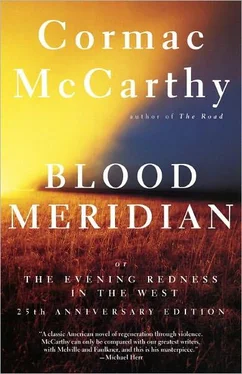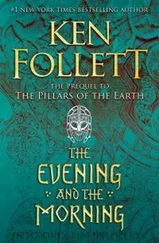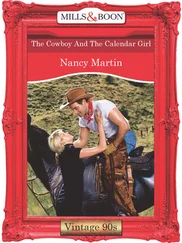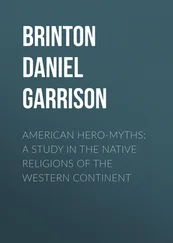He had his face turned away. The kid filled his flask from his own and reseated the stopper where it hung by its thong and drove it home with the heel of his hand. Then he rose and looked off to the south.
Yonder they come, he said.
Shelby raised up on one elbow.
The kid looked at him and he looked at the faint and formless articulation along the horizon to the south. Shelby lay back. He was staring up at the sky. A dark overcast was moving down from the north and the wind was up. A clutch of leaves scuttled out of the willow bracken at the edge of the sand and then scuttled back again. The kid crossed to where the horse stood waiting and took the pistol and stuck it in his belt and hung the canteen over the saddlehorn and mounted up and looked back at the wounded man. Then he rode out.
* * *
He was trotting north on the plain when he saw another horseman on the grounds before him perhaps a mile distant. He could not make him out and he rode more slowly. After a while he saw that the rider was leading the horse and after a while he could see that the horse was not walking right.
It was Tate. He sat by the wayside watching the kid as he rode up. The horse stood on three legs. Tate said nothing. He took off his hat and looked inside it and put it on again. The kid was turned in the saddle and he was looking to the south. Then he looked at Tate.
Can he walk?
Not much.
He got down and drew up the horse’s leg. The frog of the hoof was split and bloody and the animal’s shoulder quivered. He let the hoof down. The sun was about two hours high and now there was dust on the horizon. He looked at Tate.
What do you want to do?
I dont know. Lead him awhile. See how he does.
He aint goin to do.
I know it.
We could ride and tie.
You might just keep ridin.
I might anyway.
Tate looked at him. Go on if you want, he said.
The kid spat. Come on, he said.
I hate to leave the saddle. Hate to leave the horse far as that goes.
The kid picked up the trailing reins of his own animal. You might change your mind about what you hate to leave, he said.
They set out leading both horses. The damaged animal kept wanting to stop. Tate coaxed it along. Come on fool, he said. You aint goin to like them niggers a bit more than me.
By noon the sun was a pale blur overhead and a cold wind was blowing out of the north. They leaned into it man and animal. The wind bore stinging bits of grit and they set their hats low over their faces and pushed on. Dried desert chaff passed along with the seething migrant sands. Another hour and there was no track visible from the main party of riders before them. The sky lay gray and of a piece in every direction as far as they could see and the wind did not abate. After a while it began to snow.
The kid had taken down his blanket and wrapped himself in it. He turned and stood with his back to the wind and the horse leaned and laid its cheek against his. Its eyelashes were thatched with snow. When Tate came up he stopped and they stood looking out downwind where the snow was blowing. They could see no more than a few feet.
Aint this hell, he said.
Will your horse lead?
Hell no. I caint hardly make him foller.
We get turned around we might just run plumb into the Spaniards.
I never saw it turn so cold so quick.
What do you want to do.
We better go on.
We could pull for the high country. As long as we keep goin uphill we’ll know we aint got in a circle.
We’ll get cut off. We never will find Glanton.
We’re cut off now.
Tate turned and stared bleakly to where the whirling flakes blew down from the north. Let’s go, he said. We caint stand here.
They led the horses on. Already the ground was white. They took turns riding the good horse and leading the lame. They climbed for hours up a long rocky wash and the snow did not diminish. They began to come upon piñon and dwarf oak and open parkland and the snow on those high meadows was soon a foot deep and the horses were blowing and smoking like steamengines and it was colder and growing dark.
They were rolled in their blankets asleep in the snow when the scouts from Elias’s forward company came upon them. They’d ridden all night the only track there was, pushing on not to lose the march of those shallow pans as they filled with snow. They were five men and they came up through the evergreens in the dark and all but stumbled upon the sleepers, two mounds in the snow one of which broke open and up out of which a figure sat suddenly like some terrible hatching.
The snow had stopped falling. The kid could see them and their animals clearly on that pale ground, the men in midstride and the horses blowing cold. He had his boots in one hand and his pistol in the other and he came up out of the blanket and leveled the pistol and discharged it into the chest of the man nearest him and turned to run. His feet slid and he went to one knee. A musket fired behind him. He rose again, running down a darkened slash of piñon and turning out along the face of the slope. There were other shots behind him and when he turned he could see a man coming down through the trees. The man stopped and raised his elbows and the kid dove headlong. The musketball went racketing off among the branches. He rolled over and cocked the pistol. The barrel must have been full of snow because when he fired a hoop of orange light sprang out about it and the shot made a strange sound. He felt to see if the gun had burst but it had not. He could not see the man any more and he picked himself up and ran on. At the foot of the slope he sat gasping in the cold air and pulled on the boots and watched back among the trees. Nothing moved. He rose and stuck the pistol in his belt and went on.
* * *
The rising sun found him crouched under a rocky promontory watching the country to the south. He sat so for an hour or more. A group of deer moved up the far side of the arroyo feeding and feeding moved on. After a while he rose and went on along the ridge.
He walked all day through those wild uplands, eating handfuls of snow from the evergreen boughs as he went. He followed gametrails through the firs and in the evening he hiked along the rimrock where he could see the tilted desert to the southwest patched with shapes of snow that roughly reproduced the patterns of cloud cover already moved on to the south. Ice had frozen on the rock and the myriad of icicles among the conifers glistened blood red in the reflected light of the sunset spread across the prairie to the west. He sat with his back to a rock and felt the warmth of the sun on his face and watched it pool and flare and drain away dragging with it all that pink and rose and crimson sky. An icy wind sprang up and the junipers darkened suddenly against the snow and then there was just stillness and cold.
He rose and moved on, hurrying along the shaly rocks. He walked all night. The stars swung counterclockwise in their course and the Great Bear turned and the Pleiades winked in the very roof of the vault. He walked until his toes grew numb and fairly rattled in his boots. His path upon the rimrock was leading him deeper into the mountains along the edge of a great gorge and he could see no place to descend out of that country. He sat and wrestled off the boots and held his frozen feet each by turn in his arms. They did not warm and his jaw was in a seizure of cold and when he went to put the boots back on again his feet were like clubs to poke into them. When he got them on and stood up and stamped numbly he knew that he could not stop again until the sun rose.
It grew colder and the night lay long before him. He kept moving, following in the darkness the naked chines of rock blown bare of snow. The stars burned with a lidless fixity and they drew nearer in the night until toward dawn he was stumbling among the whinstones of the uttermost ridge to heaven, a barren range of rock so enfolded in that gaudy house that stars lay awash at his feet and migratory spalls of burning matter crossed constantly about him on their chartless reckonings. In the predawn light he made his way out upon a promontory and there received first of any creature in that country the warmth of the sun’s ascending.
Читать дальше












